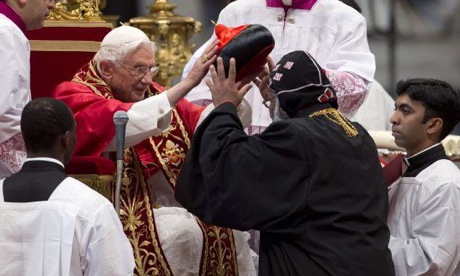Pope Benedict XVI sent a clear signal about the universality of the Catholic Church when he created six new cardinals on November 24. For the first time in decades, all of the new cardinals came from countries outside Europe.
“I want to highlight in particular the fact that the Church is the Church of all peoples, so she speaks in the various cultures of the different continents,” the Pope said during the hour-long service in St Peter’s Basilica, Rome.
“Amid the polyphony of the various voices, she raises a single harmonious song to the living God.”
He added: “What makes the Church catholic is the fact that Christ in his saving mission embraces all humanity.”
The six new cardinals from four different continents represented two Eastern Catholic Churches as well as the Latin rite.
They were: United States Archbishop James M. Harvey, 63, former prefect of the papal household; Lebanon’s Maronite Patriarch Bechara Rai, 72; Indian Archbishop Baselio Cleemis Thottunkal, 53, head of the Syro-Malankara Catholic Church; Nigerian Archbishop John Olorunfemi Onaiyekan, 68, of Abuja; Colombian Archbishop Ruben Salazar Gomez, 70, of Bogota; and Philippine Archbishop Luis Tagle, 55, of Manila.
The new Eastern Catholic cardinals received modified versions of the biretta, consistent with the distinctive clerical garb of their churches. Cardinal Rai received the turban-like Maronite tabieh, and Cardinal Cleemis a head covering in a shape reminiscent of an onion dome.
The consistory increased the College of Cardinals to 211 members, 120 of whom are under the age of 80 and thus eligible to vote in a conclave to elect a new pope.
Though fewer than 24 per cent of the world’s Catholic live in Europe, 52 per cent of the voting cardinals still come from that continent, with 23 per cent from Italy.
Sources:
Image: The Hindu
